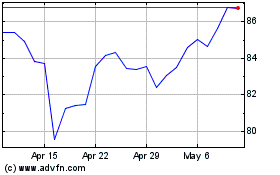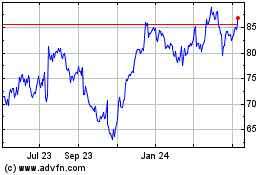By Tatyana Shumsky
U.S. corporations are spending more for sound advice. Finance
chiefs at companies including Baxter International Inc., Northern
Trust Corp. and Alaska Air Group Inc. are turning to outside
consultants as they grapple with increasingly complex challenges
ranging from shareholder activism to merger integration.
The U.S. consulting market, the world's largest, grew by $3.9
billion, or 7.7%, in 2015 to $54.7 billion, according to Source
Global Research. That was on top of a $4.2 billion increase the
year before. The market research firm, which focuses on large and
midsize consultants, expects U.S. fees to grow another 10% this
year.
In an era of slow economic growth, chief financial officers are
looking for ways to expand revenue and profit while keeping head
count low. Finance chiefs must weigh the steep costs of consulting
services against the potential benefits that expert outside advice
can deliver.
Fast-paced technological innovation, increased regulation and
new competition are among the factors contributing to the demand
for outside advice, according to consultants and market
researchers.
"Consultants are like plumbers; they're hired when there's
something wrong with your heating system and it's not economically
worth you training to be a plumber," said Fiona Czerniawska,
co-founder of Source Global.
For medical-equipment maker Baxter, the decision to call for
expert help came last August, when executives were notified that
activist hedge fund Third Point LLC had purchased a stake in the
company that soon rose to nearly 10%.
"We brought in a number of advisers to ensure that we were
taking the right steps at the right time," said Baxter CFO Jay
Saccaro.
The consultants helped Baxter's team evaluate how management
strategy and governance practices were perceived by shareholders,
and identified key concerns, he said. They also helped Baxter craft
and execute an agreement with the fund that included scrapping the
board's staggered structure and adding Third Point partner Munib
Islam to the board.
Since then, Mr. Islam has become a valuable asset to the Baxter
team, Mr. Saccaro said. Mr. Islam helped the company hire José
Almeida as chief executive officer and advised Baxter on the
regulatory complexities of selling stock in spinoff Baxalta Inc.,
he said.
"In our case, the situation has worked out quite well," Mr.
Saccaro said.
To be sure, shoveling money at consultants raises the hackles of
some experts who say such reliance on outside advisers prompts
questions about management's competence. Top executives should have
the tools and techniques to cut costs, evaluate strategy or lead a
restructuring, said Lawrence Hrebiniak, emeritus professor of
management at the Wharton School of the University of
Pennsylvania.
"The C-suite should know how to do most of these things. They
should know how to do strategic thinking," he said.
However, sudden change may require temporary expertise.
"Situations sometimes call for a surge of qualified, capable people
that you need for a period of time but not forever," said Fred
Crawford, senior vice chairman at consulting firm AlixPartners LLP.
Mr. Crawford said the benefit of hiring consultants for a project
is that after a defined period of time, CFOs can "then ask them to
leave."
Northern Trust sought consulting help with Federal Reserve
regulations that, beginning in 2014, required it to pass so-called
stress tests, which are designed to show how the asset-custodian
company would fare in an economic downturn.
"It's not like we've been doing this for 20 years," said Joyce
St. Clair, chief capital management officer, who oversees Northern
Trust's stress-test process. "One reason we work with outside
consultants is so we have a solid understanding of best practices
and to stay abreast with what our peers are doing."
Steve Sadove, CEO of retailer Saks Inc. from 2006 to 2013, said
he engaged consultants on a variety of projects targeting
cost-savings, strategy and technology. He said consultants often
bring expertise that help companies save far more than they
cost.
"I don't think you automatically bring in consultants unless you
think the value added is going to be substantially more than the
cost or when you absolutely don't believe you have the resources,"
Mr. Sadove said.
When considering the cost of engaging a consultant for a
particular task, CFOs should evaluate whether the project makes
economic sense once the fees are accounted for, said Christian
Campagna, leader of Accenture Strategy's CFO & Enterprise Value
group. Many consulting companies, including Accenture, now offer to
link their fees to the realized cost reductions or benefits.
CFOs appreciate how this aligns consultants' interests with
their own. "It gives them a better feeling that the consultants are
really worth what they're spending on them," Mr. Campagna said.
Keeping costs down is a focus for Alaska Air CFO Brandon
Pedersen as his team prepares to merge with Virgin America Inc. The
company plans to use consultants in a variety of roles including
the integration of technology systems and getting regulatory
approval for the two carriers to operate as one, according to a
company spokeswoman.
"Price matters a lot," Mr. Pedersen told investors on the
company's earnings call in April. "While there will be consultants,
the budget for consultants is going to be tightly controlled."
Write to Tatyana Shumsky at tatyana.shumsky@wsj.com
(END) Dow Jones Newswires
July 25, 2016 13:51 ET (17:51 GMT)
Copyright (c) 2016 Dow Jones & Company, Inc.
Northern (NASDAQ:NTRS)
Historical Stock Chart
From Mar 2024 to Apr 2024

Northern (NASDAQ:NTRS)
Historical Stock Chart
From Apr 2023 to Apr 2024
